Why Bernie Sanders lost
The socialist label was too much to overcome in a year when Democrats just want to beat Trump
Bernie Sanders is not going to win the Democratic presidential nomination—at least not without some unforeseen medical event for or historic gaffe from Joe Biden. My latest delegate math projects that Sanders will be down 140 delegates after the states that have voted so far are finished counting their ballots. By next week, if polls are correct, that deficit will grow to roughly -240 delegates. There won’t be any coming back from such a sever margin.
Sanders knows the trouble he’s in. At a speech from Burlington, Vermont on March 11th, he said that he was winning the primary’s ideological debate, but “losing the debate over electability.” He launched into a laundry list of policies he believes Joe Biden is too moderate on and said he’d be challenging him on them—if not for the nomination—at Sunday’s televised debate.
Sanders’s struggle to convince Democrats that he is electable is certainly one reason why he has lost the party’s presidential nomination. An exit poll from Michigan showed that 58% of Democratic primary voters would rather have a nominee who can beat Trump, versus 37% who want one who agrees with them on most issues. Among those electability-minded voters, Biden beat Sanders by 32 percentage points, 62% to 30%. Here’s more on that exit poll from the Washington Post:
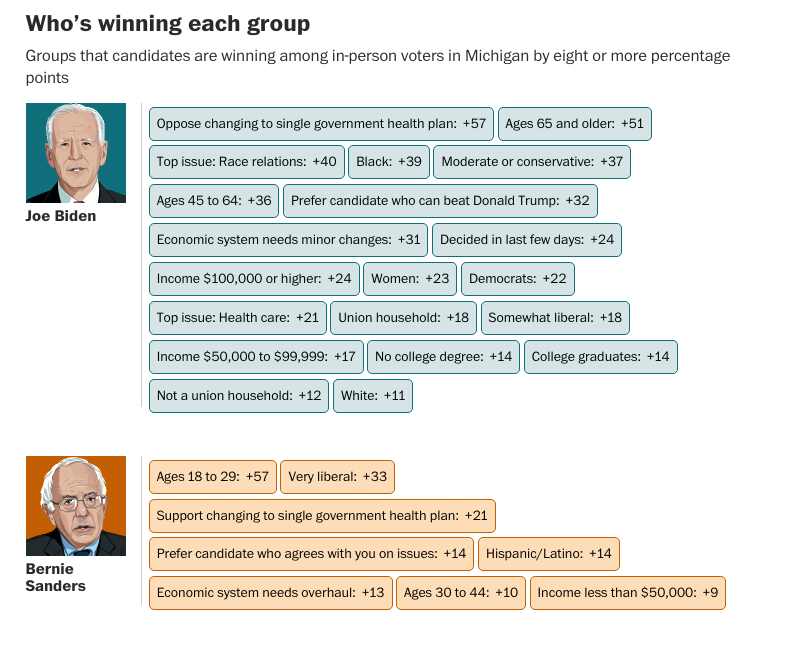
I would not, however, characterize this as Sanders’s biggest fault. No; primarily, it appears that Sanders lost the 2020 Democratic presidential nomination because he lost support among working-class white voters who supported him as a default anti-Hillary candidate in 2016. With a “likeable,” moderate, male candidate to vote for this time, they were free to oppose Sanders. This shows up in the exit polls, but also the county-level results.
The following four graphs show you that Bernie’s vote share fell by larger amounts in white, working-class and rural areas. Turnout also fell in those areas, but not by enough to explain the difference in Sanders’s vote share—in other words, he suffered not just because non-college whites left the Democratic party, but also because those that remained switched to voting for him last time to Biden this time:
Here is the decline in Sanders’s vote share in Michigan from 2016 to 2020 by both white working-class share and population density:
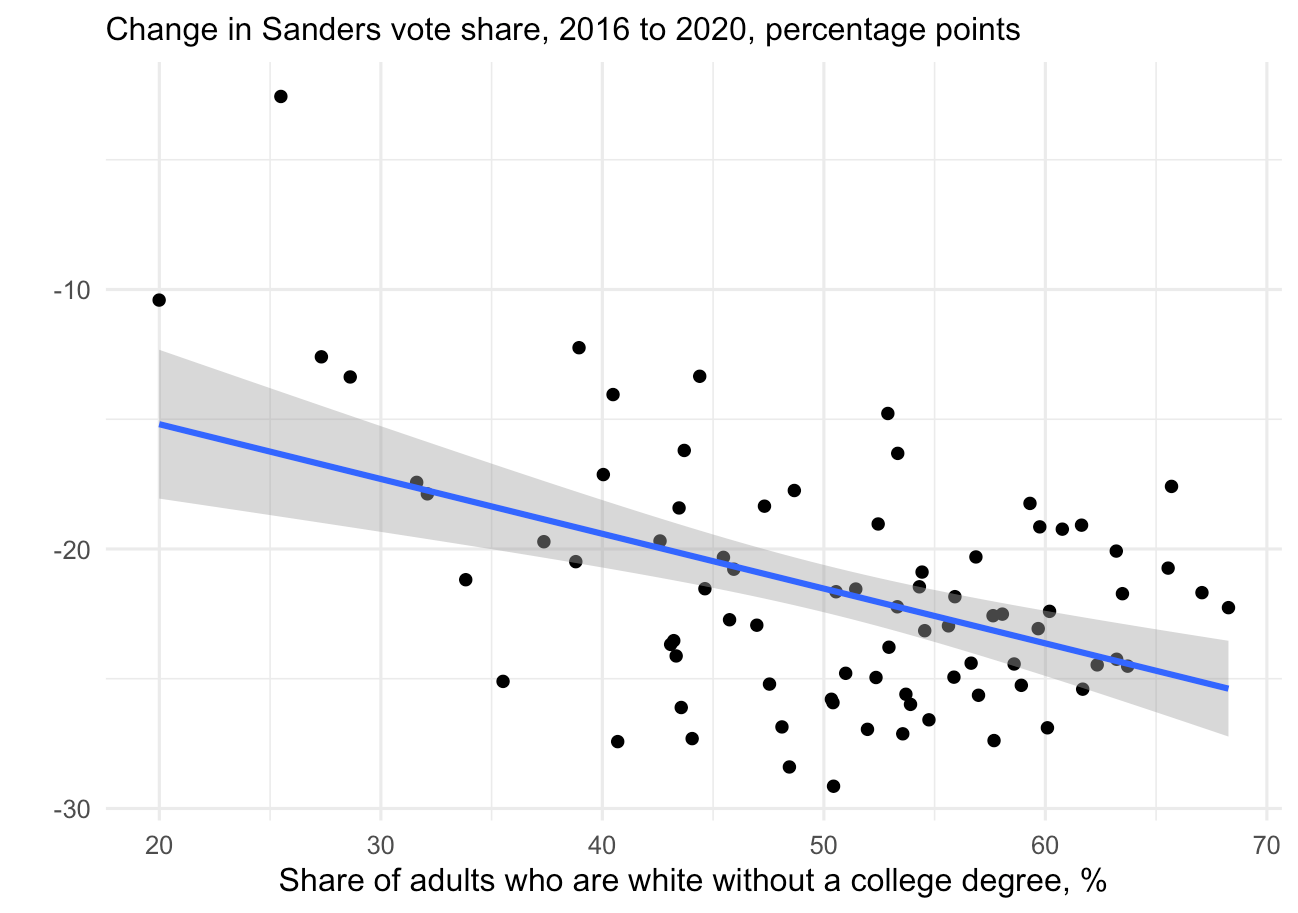
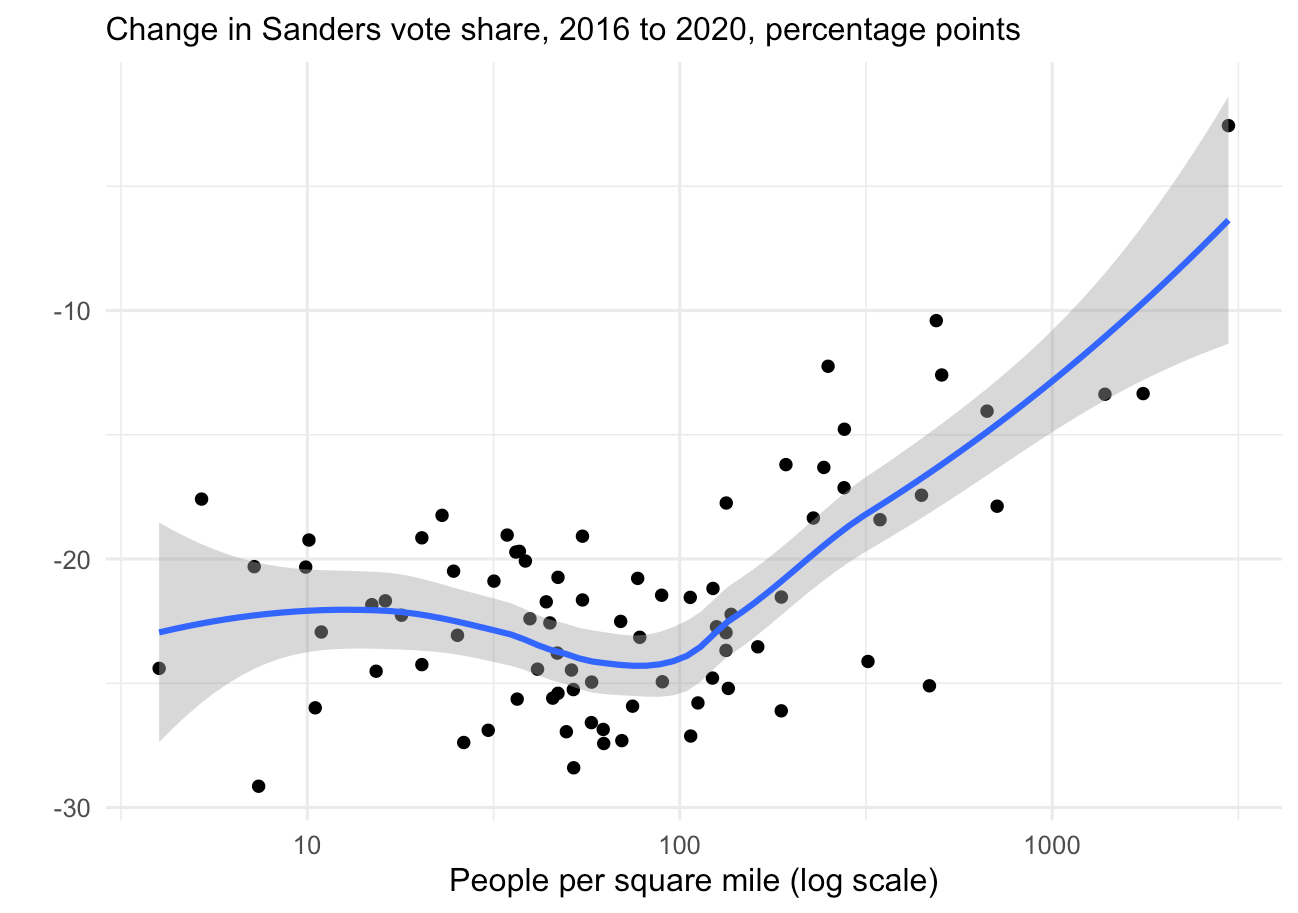
And here is the change in turnout from 2016 to 2020 by the same variables:
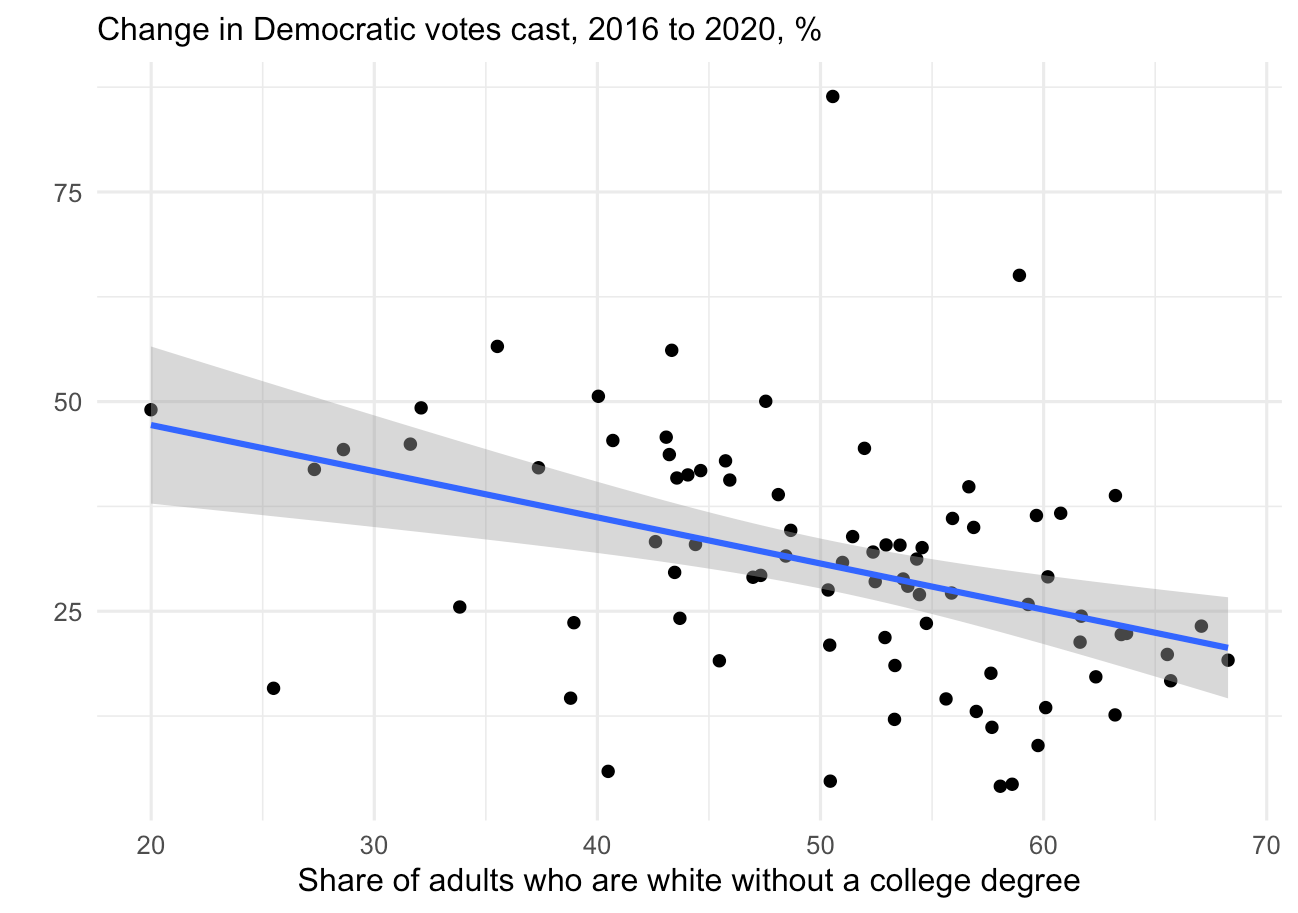
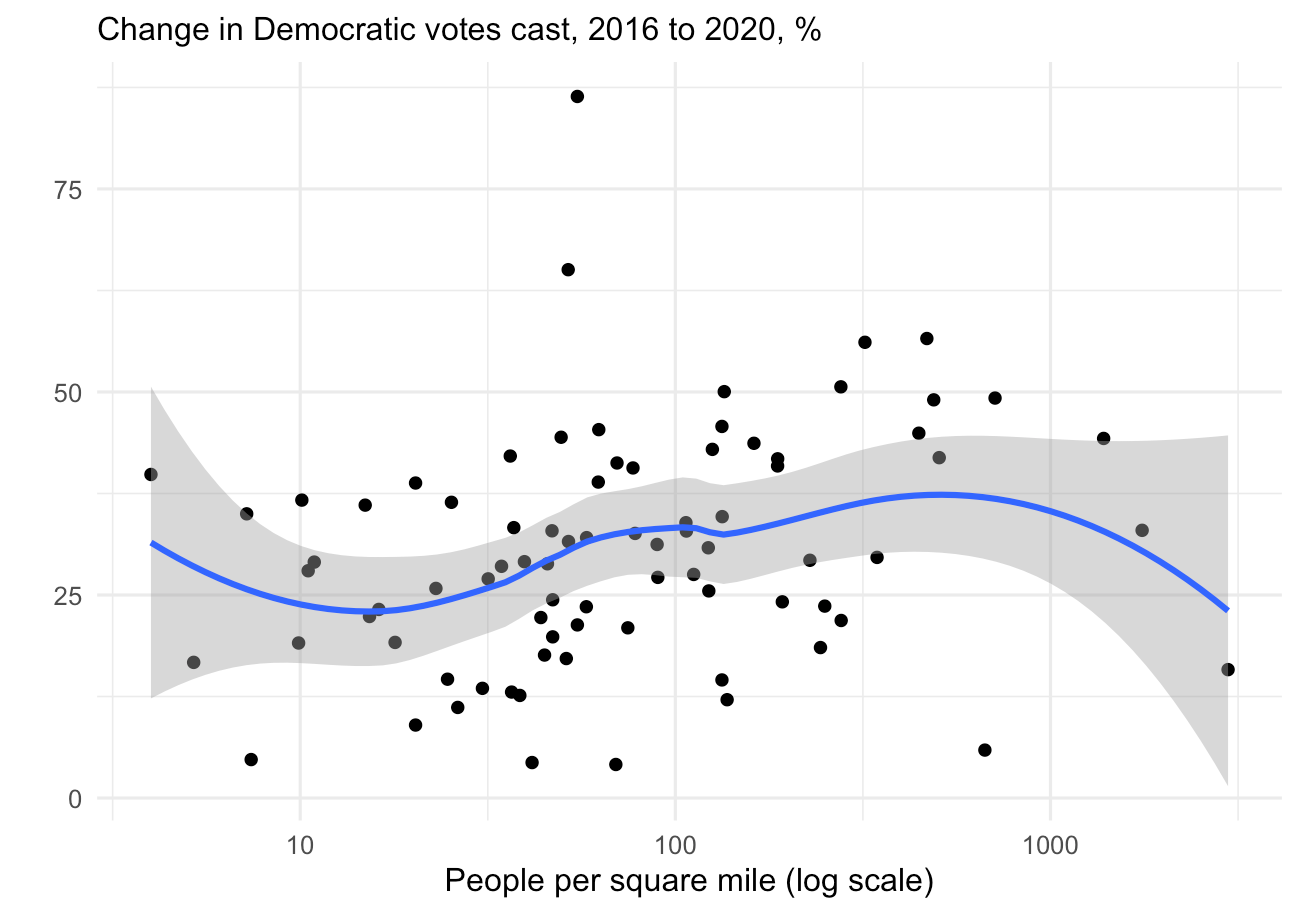
Despite the leftward drift of the Democratic party, it remains hard for a socialist to win elections in America. Poll after poll from YouGov showed that all adults—and often Democrats, too—regularly viewed him as less prepared than Joe Biden to defeat Donald Trump in November. It is the inevitable curse of fringe candidacies (such as Mr Sanders’s for most of his tenure) that they are doomed to win votes only from citizens who are equally divorced from the median voter—and the majority.
…
Given his role in the primary (and prospects of winning), Sanders has made the right calculation. He is going to push Joe Biden, now the presumptive Democratic nominee, to embrace some of the policies he has championed. It is unclear if he will do so. Joe Biden has won the primaries because of moderates and electability-minded voters. They will be turned off if he suddenly embraces Medicare for All and the Green New Deal (of course, he is unlikely to do so). But there is likely some tolerance for ideological adjustments by Biden. Comparing 2016 turnout to 2020 turnout in Michigan, we see that college-educated voters cast many more ballots than non-college-educated ones. They make up a bigger share of the Democratic electorate this year than last year. And since education correlates with a greater willingness to adopt progressive issue positions, they are a bit more liberal as well. Such is evident in polls nationwide, too, for what it’s worth.

…
So now, the general election starts. The surge in Democratic primary turnout in the Midwest is a promising sign for Joe Biden’s chances to beat Donald Trump in November. Polls show the president losing to Biden there by about 5 points. Such a margin, if it were to happen in November, would very likely deliver Biden the presidency. But we’re a long way off from that. Plenty can happen between now and the general election. There are lots of unknowns. But now, with both a Democratic and Republican nominees for president, we can finally move on to figuring out what they are.
Editor’s note:
Thanks for reading my thoughts on this subject. And thanks for subscribing! Your membership adds up and makes all this newslettering possible (reminder: I do all this work independently). Please consider sharing online or with a friend; the more readers, the merrier—and the easier it is for me to devote time to blogging.
As always, send me your tips about what you’d like to read about next, or your feedback otherwise. You can reach me via email at elliott@thecrosstab.com or @gelliottmorris on Twitter.
—Elliott




Another excellent column; however, you failed to mention the Fidel comment, which underscores Sanders' underlying socialist bend....BTW, I am one who agrees more with Sanders on the issues, but wants Biden to get the nomination because he is Trump's greatest nightmare....